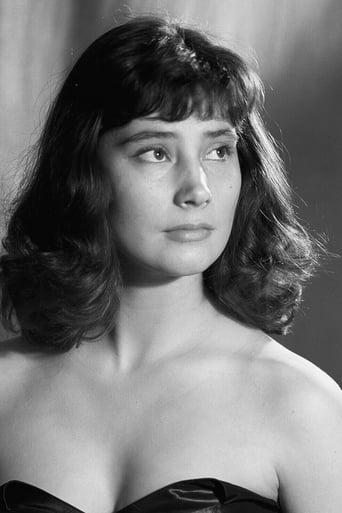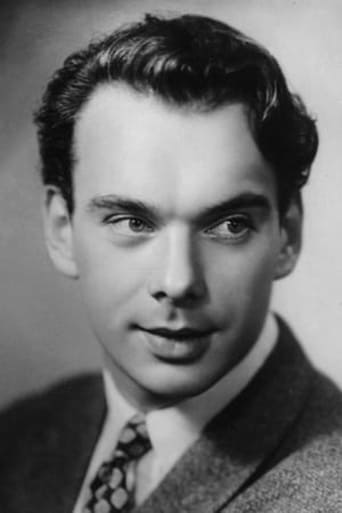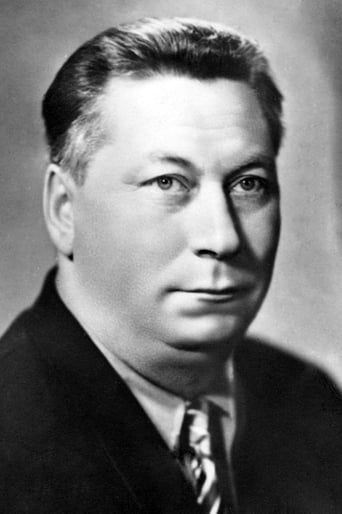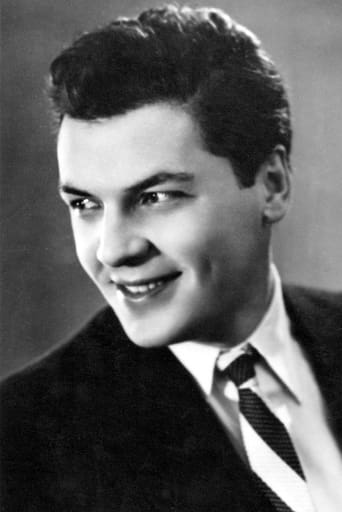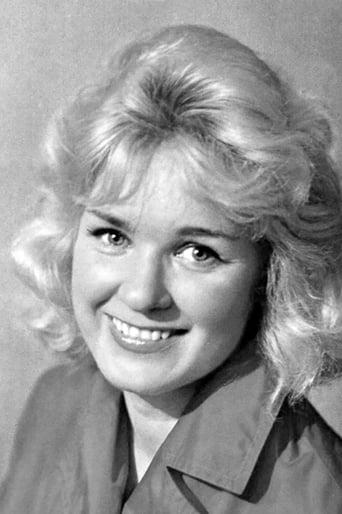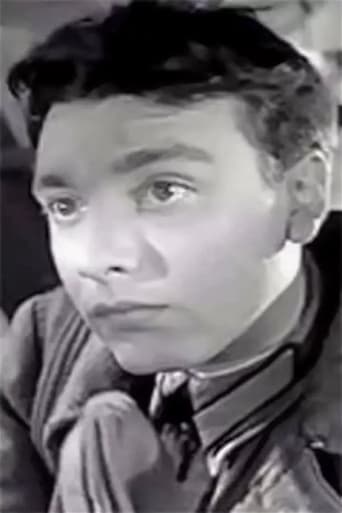BlazeLime
Strong and Moving!
AniInterview
Sorry, this movie sucks
Fairaher
The film makes a home in your brain and the only cure is to see it again.
Beulah Bram
A film of deceptively outspoken contemporary relevance, this is cinema at its most alert, alarming and alive.
Robert J. Maxwell
What a striking picture, especially coming from the Soviet Union in 1957. Some of the shots resemble, oh, I don't know, nouvelle vague. The director was Mikhail Kalatozov. He makes splendid use of light values and composition. The shadows are stark black, and if there are four people involved in a confrontation the figures may be arranged at three different levels on a staircase. The plot is pointed towards patriotism on everyone's part. There is nothing resembling propaganda in this love triangle, any more than there was in the abominable "Pearl Harbor." It's a celebration of the ability of most ordinary people to endure hardship. And that hardship was very real in Russia, from the beginning with the German invasion to the ultimate triumph. First, the Russians had about 8 million deaths in the military, and about 13 million civilians lost their lives. For comparison the total American deaths, both military and civilian, were about 420,000. Moreover, as the Nazi threat to the industrial centers of cities like Moscow and Stalingrad increased, the Soviets packed up both workers and plants and move them across the Ural Mountains. Imagine, say, St. Louis being physically move west of the Rockies.But this is the story basically of a woman, Veronica, whose lover is marched off to war, whose family is killed in an air raid, who moves in with the family of her fiancé, who is raped by her fiancé's brother, who takes up with her rapist, who is sufficiently shamed by her betrayal of her lover at the front that she is barely stopped from committing suicide. Her fiancé is reported to have been wounded and died at the front, but no one has actually seen him buried. Is he still alive somewhere? Evidently not, because Veronica brings an armload of flowers to the train bringing the soldiers home, hoping to find him in the milling crowd. But he's not there. Tearfully she begins distributing flowers, bit by bit, to the noisy celebrants at the station -- bearded old men, young men in uniform, babies, grief-stricken babushkas, little boys, everyone. Well -- what else can she do but recognize that the victory in the Great Patriotic War dwarfs her personal tragedy. "It doesn't take much to see that the problems of three little people don't amount to a hill of beans in this crazy world." Veronika is a decent actress. The casting is especially precise because neither she nor her boyfriend Boris are extraordinarily beautiful. They're agreeable to look at, but rather ordinary. Veronika is not Olga Kurilenko, and Boris is no, well, whatever the male equivalent of Olga Kurilenko might be. There are no speeches about Mother Russia. Stalin's name is never mentioned. He was a complete bastard before and during the war and killed more Russians than the Nazis did. There IS one victory speech at the end. A returning soldier shouts to the crowd that we must never let war happen again and we must pursue peace. The Germans are called "brutes," once, but that's all. The enemy is war itself. The sentiment must be justified because we all seem to salute it as we pass it on the way to the next war.I feel I have to expatiate a bit on the direction and camera work because probably most people watching the movie won't recognize how innovative two Soviet movies were at the time, how much impact they had on the West. In the companion piece, "Ballad of a Soldier," for instance, there is a scene is which a Russian soldier is running towards the elevated camera, sprinting like hell to avoid a German tank that's pursuing him.The camera is held still as the soldier rushes under and past it, disappearing off the screen. When the tank races past the same location, the camera follows the tank by leaning so far forward that the image on the film -- tank chasing man -- is upside down. That's nothing now, of course, when cameras twirl around and do pirouettes, but in 1957 that technique was NEW.
gavin6942
Veronica plans a rendezvous with her lover, Boris, at the bank of the river, only for him to be drafted into World War II shortly thereafter.I know very little about Soviet film. Really my only experience after the 1930s that quickly comes to mind is "Stalker". I am sure there are others, including other Tarkovsky films, but I am drawing a blank. This one is a nice exception to the forgettable films.Any story of Russia in World War II is good. Americans like to believe they single-handedly defeated Japan and Germany, conveniently forgetting that Russia was the primary opponent of Germany at the time. More films covering that cannot hurt. But then add a romantic angle? Excellent! There is something rather French about this film, which seems appropriate... the cultured class of Russia always seemed to love the French.
revival05
The Cranes Are Flying is a film just as mesmerizing as the title suggests. It's stark and poetic, emotional but existential, it's about human nature, human life, human circumstance. The story is a simple and often told one, but then again, the stories of life tend to be simple and often told. The heart of the film lies in the very beginning where the two young lovers Veronika (Tatyana Samojlova) and Boris (Aleksey Batalov) stand in each other's arms and watch the cranes flying in the sky. They love each other. They don't know it yet, but they are about to be separated by war. This is the first and last moment of peace, harmony and love in their lives. The rest of their years are going to be filled with heartache, guilt, hardships, hunger, grief, death. The film ends on a hopeful and even joyous note. You have to see it to believe it.This is the first point. Very simple. It's a wonderful film that you should see. Then there are the historical notes, and the technical qualities to marvel about. Based on a play by Viktor Rozov, who wrote the screenplay, the film was directed by Mikhail Kalatozov who was one of the first Soviet filmmakers to emerge and blossom after Stalin's death (he was his former head of production). He would make tremors with his 1964 pro-Castro documentary I Am Cuba, but The Cranes Are Flying won him the Palme D'Or in 1957. It's no wonder either, not only does the film prove amazing craftsmanship but it would also remind anyone of a more general European art film from the same time (the French New Wave easily comes into mind). At the same time, it seems to have managed to pass all of the demands from the Soviet Union. It doesn't come off as a patriotic spectacle of propaganda but, as I said, it does end hopefully, with the love for the people shining from within the people itself.Tatyana Samojlova is the heroine of the film, and Kalatozov is occupied following her with the greatest of care. Much of the film is portrayed in silence, but it's not the kind of artistic silent quality you might expect. It's a quiet film, the absence of sound is naturalistic, as are the cranes in the sky and the feelings of Veronika as her childish romance dies out while she grows older in the war times. She loves Boris, lost in field. She marries a man she doesn't love. The film suggests feelings of guilt and shame. We're not sure, Samojlova is too human. There are breathtaking moments of film making in this film that, made in 1956, seems to predate most original methods of film making - and, I'd say, to this day it's not often you see sequences like the one where she is desperate, running along a train seemingly at the same speed, whilst the film itself seems to react at the sudden impact of speed and emotion. It's like the entire film looses control over itself, she almost outruns it herself, and you can't say what will happen the very next second or, once that second has passed, the second after that.This is a film about human beings, the value of human life, of love and family and hope. But it's not entirely an anti-war film, as one might suppose. This is a film where the characters face their sadness and their emotional tragedies right up front and never tries to deny them or shun from them, or in any way prolong their suffering. There is a higher cause and life must be lived by the citizens of an entire country in hope, because if we loose hope the suffering will have been pointless.
jaredmobarak
Director Mikhail Kalatozov's film The Cranes are Flying (Letyat zhuravli) is a glorious piece of cinema. From the screenplay by Viktor Rozov, based on his own play, Kalatozov shows us a vision of the heroism of war and the suffering by those left at home. Inundated with countless war movies showing us the frontlines and the carnage, the topic itself becomes tedious and avoidable. However, this Russian gem shows how the tale of hardship can be told in a different way; by telling us, straight from a soldier's mouth how war is hated by all, that they hope those who died did so for a cause that will allow for peace and the end of fighting, we see a new vision of WWII. We have young men volunteering to wage war for peace, to keep their families and loved ones safe at home rather than draftees fighting a battle they don't believe in. With so much hatred towards our current situation in the Middle East, and how people are dying for no reason, against their will, it's nice to see a film that shows just how selfless and heroic these soldiers are, as well as those awaiting their return.Communist Russia shows how involved all were in the war. While Boris may have volunteered to go to the frontlines, his father is head doctor of a hospital aiding in the mending of soldiers injured and his sister is helping him there as well as his girl Veronika, doing all she can to keep her mind off the fact that no letter has arrived from her love. An entire city comes out to send the boys off in celebration. Even the factory that Boris and his friend Stepan work for send representatives over with gifts of gratitude. Whether this is all a glorified look into Russia at the outset of WWII or not, I don't know. There are no protests or badmouthing of these boys risking their lives for a country, it is all praise and thanks. Some in America could learn a lesson from this because whether you agree with the war at hand or not, protesting and wreaking havoc in its name only sullies what these men and women are sacrificing each and everyday.The acting is top-notch throughout, but some deserve singling out. I really enjoyed Antonina Bogdanova in a small role as Boris' grandmother. She is the one family member he can trust and her sadness at his leaving is very evident on her face and through her body language. Vasili Merkuryev, as the patriarch Fyodor Ivanovich, brings what is perhaps the best performance. As spoken at the end, about fathers needing to choke back hidden tears, Merkuryev epitomizes those sentiments. He puts on a tough exterior, especially cracking jokes and riding his son hard when he finds out about his volunteering just hours before he must leave. But when Boris exits to go to the assembly station we see the true pain of the man, seated in sorrow at the table. He loves his son dearly and although he may not be able to show it to him, his actions throughout the film express it to the audience. Aleksey Batalov is effective as Boris, a happy-go-lucky young man, and idealist, doing what he believes is right, and Aleksandr Shvorin is good as the villainous Mark, staying home due to his talented piano skills, or maybe just to steal his cousin's love. That love, played by Tatyana Samojlova, really draws the audience in to her grief, dejection, and slim glimmer of hope. The true star of the film, she must go through many emotions on a journey where she does lose her way, needing to steer back on course, hoping that she did so soon enough for Boris' return.Besides the realism to the story, as well as being unafraid to use tragedy to get the theme across, I also loved the visual style of the film. Sergei Urusevsky's cinematography is amazing, especially when considering the movie was shot in fullscreen. It is one thing to create stunning compositions in a widescreen panorama; it is completely different to do so in a square frame. Right from the beginning we get a beautiful static shot of a winding walkway along water, a bridge in the background at the top, as our two lovers skip their way up the screen and into the distance. There are multiple instances of the camera being behind barriers yet still allowing for the action to be seen, creating unique spatial depth and interest at all times. Sharp angles are utilized, as well as careful blocking to allow for overhead shots and exaggerated juxtapositions of characters in frame together.The real feats, however, are those instances of the long shot. Used well towards the end to follow Veronika through the mass of returning soldiers, it is magnificent earlier on as she roams through those saying goodbye to their loved ones while she searches for Boris, her own farewell needing to be said. The planning for this shot must have been extensive because while she weaves in and out of people, the camera focuses on couples kisses, people yelling to one another, and more, all purposely in frame at specific moments while the camera moves through. Everyone needed to hit his mark precisely and it leads to a brilliant piece of cinema. It's just one part of an overall masterpiece of tone and style; The Cranes are Flying shows how successful placement and mise en scène can be in showing the audience what it needs in as simple a way as possible. Composition and professionalism from the actors and crew can work wonders, adding something that huge setpieces and special effects can never do.


